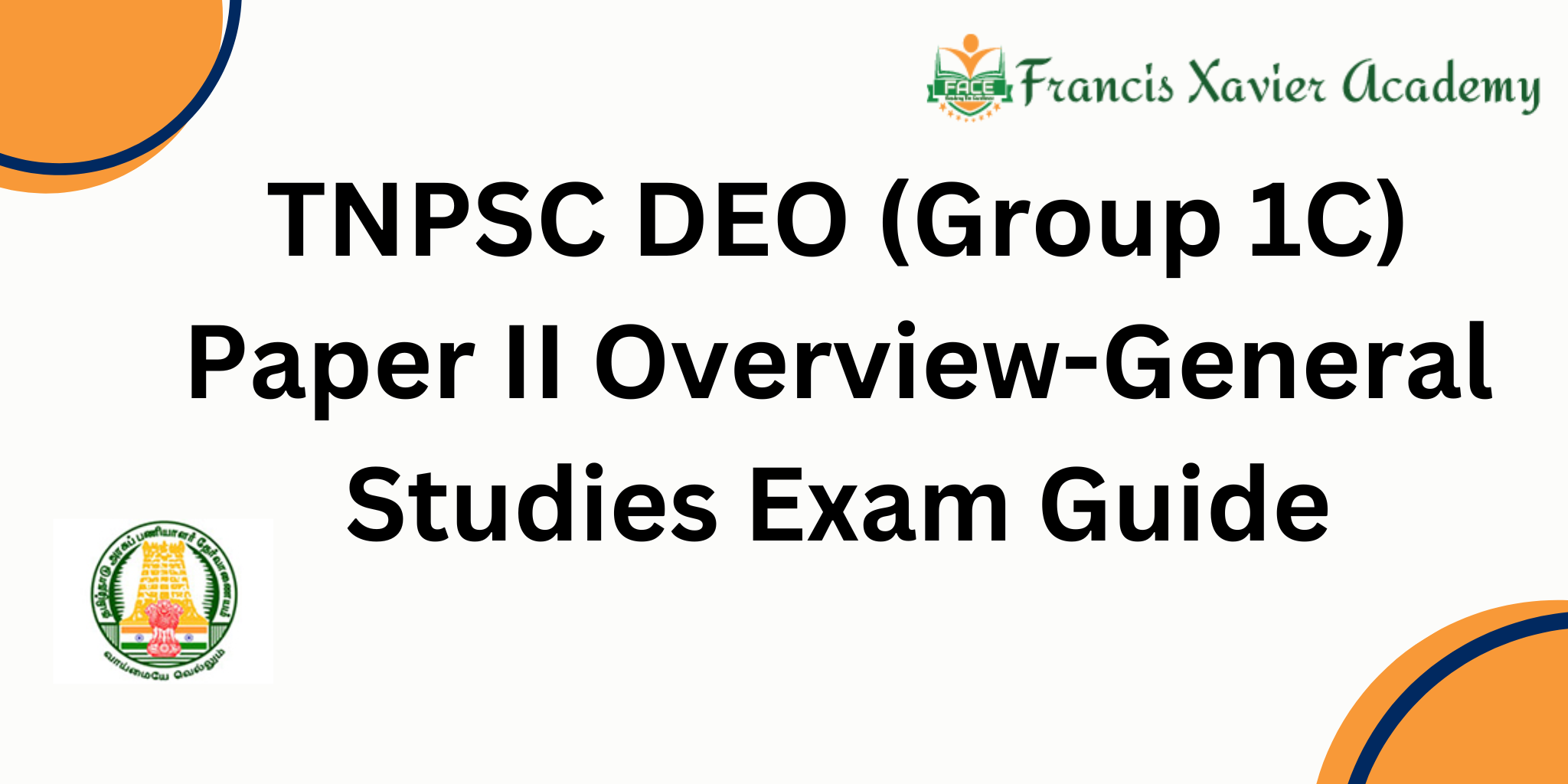
The Tamil Nadu Public Service Commission (TNPSC) conducts the District Educational Officer (DEO) (Group 1C) Services Main Examination to recruit skilled candidates for leadership roles in the education sector. This exam evaluates their ability to understand historical events, analyze data, and apply scientific knowledge to real-world problems. This TNPSC DEO (group1C) paper II overview covers key topics in Paper II- General studies, which includes:
- Modern History & Indian Culture – India’s colonial past, independence struggle, and socio-cultural evolution.
- General Mental Ability – Data interpretation, problem-solving, and numerical aptitude.
- Science & Technology – Basic scientific principles, technological advancements, and their role in development.
Aspirants must prepare thoroughly to meet the expectations of this examination and secure a role that contributes to the state’s educational framework.
UNIT – I: Modern History of India and Indian Culture
This section provides an in-depth look into India’s colonial past, independence movement, and cultural diversity.
Colonial Rule and Its Impact
- Advent of European Powers: The arrival of the Portuguese, Dutch, French, and British and their competition for supremacy.
- Expansion of British Rule: Battle of Plassey (1757) and Buxar (1764), establishment of British dominance through policies like Doctrine of Lapse and Subsidiary Alliance.
- Economic and Social Impact: Drain of wealth, introduction of permanent settlement, changes in agriculture, and social transformation.
Freedom Struggle & National Leaders
- Early Revolts: The 1857 Revolt (First War of Independence) and various peasant and tribal uprisings.
- Rise of Nationalism: Formation of the Indian National Congress (INC) and movements like the Swadeshi Movement, Non-Cooperation, and Quit India Movement.
- Role of Leaders:
- Mahatma Gandhi: Non-violence and civil disobedience.
- Jawaharlal Nehru: Architect of modern India.
- Subhas Chandra Bose: INA and Azad Hind Fauj.
- Rabindranath Tagore: Literary and cultural contributions.
Socio-Cultural & Reform Movements
- Religious and Social Reformers: Raja Ram Mohan Roy, Jyotiba Phule, Periyar, and Bharathiar.
- Dravidian Movement in Tamil Nadu: Rise of self-respect movements, social justice policies, and its impact on Tamil society.
- Fine Arts & Cultural Heritage: Growth of Indian dance, drama, and music institutions.
India’s Cultural Diversity
- Unity in Diversity: Multiple languages, customs, traditions, and religions coexisting harmoniously.
- India as a Secular State: Constitutional provisions ensuring freedom of religion and cultural rights.
UNIT – II: General Mental Ability
This section assesses logical reasoning, numerical ability, and problem-solving skills essential for decision-making.
Data Interpretation & Presentation
- Conversion of information to data: Understanding and analyzing statistics.
- Tables, Graphs, and Diagrams: Representation and interpretation of information through bar charts, pie charts, and histograms.
Arithmetic and Logical Reasoning
- Basic Concepts:
- HCF & LCM
- Percentages, Ratios, and Proportions
- Time, Speed, and Distance calculations
- Simple & Compound Interest
- Problem-Solving Techniques: Logical deduction, pattern recognition, and decision-making scenarios.
Information and Communication Technology (ICT)
- Basic Computer Knowledge: Hardware, software, networking, and operating systems.
- Application of ICT: E-governance, digital literacy, and cybersecurity.
- Decision Making and Problem Solving: How technology aids governance, crisis management, and administration.
UNIT – III: Science & Technology in India and Tamil Nadu
This section evaluates the role of science and technology in India’s progress and how scientific advancements impact daily life.
Fundamental Science & Physics
- Laws of Motion, Energy, and Mechanics.
- Atomic and Nuclear Physics: Nuclear energy, radioactivity, and space exploration.
- Astronomy and Space Science: Contributions of ISRO, Chandrayaan, Mangalyaan, and satellite technology.
Chemistry and Environmental Science
- Chemical Reactions & Properties of Matter: Oxidation-reduction, acids & bases, and polymer chemistry.
- Biochemistry and Biotechnology: DNA, genetic engineering, and bioinformatics.
- Environmental Science:
- Natural disasters and safety measures.
- Pollution control and climate change.
Role of Science & Technology in National Development
- Defense Research and Development: Contributions of DRDO and ISRO.
- Renewable Energy and Oil Exploration: Solar, wind, and hydropower advancements.
- Remote Sensing and GIS: Applications in agriculture, disaster management, and urban planning.
Health & Human Biology
- Major Human Diseases: Communicable vs. non-communicable diseases, prevention, and treatment.
- Nutrition and Dietetics: Importance of balanced diets and food security.
- Alcoholism and Drug Abuse: Social and health impacts, along with government policies to curb substance abuse.
Conclusion
The TNPSC DEO (Group 1C) Main Examination – General Studies (Paper II) is a crucial assessment for candidates aspiring to become District Educational Officers. It requires a comprehensive understanding of history, logical reasoning, and scientific advancements. The exam tests not only factual knowledge but also analytical and problem-solving skills.
To excel in this examination, candidates should focus on:
- Thoroughly studying India’s history, cultural evolution, and political movements.
- Practicing numerical and logical reasoning problems to improve accuracy and speed.
- Understanding fundamental scientific concepts and their applications in everyday life.
- Staying updated with current affairs and technological advancements, especially in Tamil Nadu.
With structured preparation, critical thinking, and consistent revision, aspirants can successfully clear this examination and contribute to shaping Tamil Nadu’s education system. This TNPSC DEO (group1C) paper II overview will support candidates in their preparation and help the achieve success.
General studies syllabus for District Educational Officer
 Now
Now